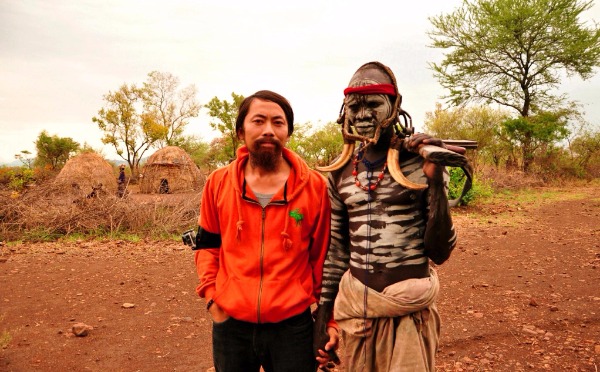
Zhu meets a local man in Ethiopia.[Photo by Zhu Zhiwen/China Daily]
BEIJING — Zhu Zhiwen appeared clean cut when he first set out to ultimately cycle 54,000 kilometers through 34 countries on three continents years ago.
He left China with a shaved face and crew cut.
Today, the tanned man’s hair is knotted into dreadlocks above his sideburns.
“Cycling itself is boring most of the time,” the 32-year-old says.
“It’s the uncertainties, such as the people and situations you encounter, that enrich the journey.”
Zhu has made seven trips through countries in Asia, Africa and South America, many of which are involved in the Belt and Road Initiative.
He returned to China for a month before departing to cycle in Colombia in mid-July.
He brings a solar-power charger and camping supplies on the road.
The adventurer typically cycles six to eight hours a day. His routine includes pitching his tent, brewing coffee and cooking meals.
Zhu sometimes stays a while in certain places to interact with the locals.
He only learned a few basic Spanish words and sometimes communicates with Latin Americans using body language, he says.
“I must follow local practices and understand the culture and etiquette so we can share respect,” he says.
“Many locals are curious about everything relating to China. I’m like a window into the country. They’re very kind.”
He recalls that the owner of a small shop in Peru gave him free snacks and invited him to dinner in January. The old man was surprised to see a Chinese cyclist in his country. He’d ask his daughter to help them communicate when they couldn’t, as she spoke English.
Zhu stayed with the family for three days and was invited to a big party.
He cooked for them and taught them how to make Chinese dishes.
“They’d eaten at Chinese restaurants in Peru but hadn’t tried authentic food prepared home-style by a born-and-bred Chinese,” he says.
“They enjoyed it, even though it was spicy.”
Zhu noticed many infrastructure projects in Africa are supported by China.
“(Africans) are interested in our food and amazed by China’s rapid development. For example, they’d ask, is the high-speed train really that fast?”
The continent hosts an abundance of wildlife. But predators avoid the roads, he says.
He once encountered a black snake in the desert. The reptile suddenly slithered into his bag when he was photographing it.
Zhu had to borrow an old man’s walking stick to fish the creature out.
“Many foreigners I’ve met believe the stereotype that all Chinese men know kung fu, especially when they see I know how to use nunchucks,” he says.
“Actually, I only learned last year for self-defense against robbery.”
He has lost about 15 mobile phones, most of which were stolen. He was robbed several times.
One man suddenly hit him on the back of his head with a stick. Fortunately, he only received a minor wound.
“You have to be low-key,” he says.
“You shouldn’t show that you’re well-off or display gadgets like cameras. Don’t go into alleys alone. Don’t fall for common tricks.”
He has tried different methods to scrape together enough money for his trips.
Zhu initially bought local specialties like carvings, paintings and coffee to resell.
He later started to write and shoot videos for magazines and online media.
He has only spent about 80,000 yuan ($11,620) in total on his trips, not including cameras, he says.
Cycling, camping and cooking are cheap or free.
“It’s cheaper than being a backpacker, who needs to pay accommodation and transport. I’d indulge myself with a good meal as a reward when I arrived in a city,” he says.
“You don’t need first-class equipment. The cyclist is what matters. I only use what’s affordable and practical.”
He cycled through seven countries from Shanghai to Nepal and India with a 900 yuan secondhand bike.
Zhu quit his job at a Shanghai trading company to go cycling at age 24.
“I realised that I’d lived a quarter of my life if I live to be 100,” he recalls.
“I didn’t want to fritter away any more time. I decided to realise my dreams while I was still young.”
He recalls that when he first learned about geography in school, he thought: “Why couldn’t I cycle the world on my favorite bike?”
His parents opposed his decision to go cycling around the world.
They thought he was dillydallying while he should be working. And they worried about his safety.
His persistence over the years won their tacit consent.
“I felt like an untamed wild horse on my first trip,” he says.
“I expanded my horizons so much. The world is so wonderful. I want to explore it more and learn to cycle as far as I’m able.”
Yu Yang, 31, who biked with Zhu from Argentina to Brazil during the 2016 Rio Olympics, says: “He has found a lifestyle that suits him. He lives every day in a worthwhile way. He’s responsible, disciplined and generous. He doesn’t want to inconvenience others.”
His 31-year-old cyclist friend, nicknamed “Yoyo”, says: “What he’s doing is so cool! He’s courageous. He chooses the life he wants.”
Zhu says the journeys have taught him there is perhaps at least one reason to settle down.
“Cycling is a part of my life but not all of it. Many friends ask if I’ll ever stop. I think I will, someday, when destiny brings me the girl of my dreams.”